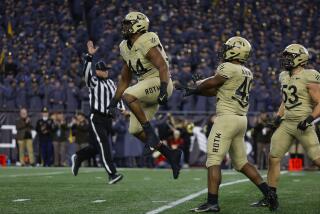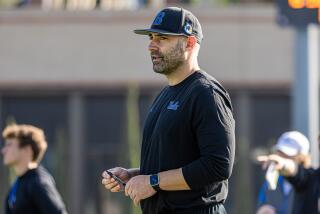Football, the Army-Navy Way
Three weeks earlier, Jason Snider woke up screaming with pain somewhere inside him. Doctors told him internal injuries to his liver, spleen and pancreas were so frightening that he risked permanent damage by playing again. Which is not what the big guy wanted to hear. A football lifer, a Navy senior, a Navy captain, he had one more Army-Navy game on his dance card.
So the week before the game, he told doctors, “I’m feeling better, let’s do another test.”
The test confirmed his diagnosis. He was sore and aching because football’s a sore and aching game. But the bruises were nothing more than bruises. So trainers rigged a flak jacket low around his back and sent him out against Army, a happy circumstance that prompted the Navy team doctor, Ed McDevitt, to deliver this profound medical explanation: “A miracle. We worked the beads.”
The doctor’s words came with a warm smile, born from the understanding that the Army-Navy game is itself a phenomenon that defies usual explanations.
Its appeal has only a little to do with the hype and glory of big-time college football. Who needs a Heisman Trophy candidate? Who needs the BCS B.S.? You can play this one without All-Americans, without NFL draft picks and with only five victories in 20 games.
None of that matters when a brigade of midshipmen and a corps of cadets snap to crisp salutes for the singing of the national anthem and stand at attention, 8,000 strong, shoulder to shoulder, men and women, the best we have, so good that one man’s notes of that moment read, “I swear, it makes you cry.”
None of that matters when an Army chaplain leads 67,335 spectators in a prayer thanking God for the men and women of Army and Navy who “ensure the freedom we enjoy around the world,” men such as John McCain, who stood on the sideline in Philadelphia for the 99th Army-Navy game last weekend.
Now a U.S. senator from Arizona, McCain, a Naval Academy graduate, spent five years in a Vietnam prisoner-of-war camp. Each time new prisoners were delivered, he asked, “Who won last year’s game?” An Army team captain three years ago, Jim Cantelupe also came to Philadelphia last week and said, “The rest of my life, I’ll never miss another Army-Navy game. I’ll tell you why.”
Discharged from the Army, signed to play in NFL Europe, Cantelupe lives in Texas. “I went to the Texas-Texas A&M; game. It’s a great rivalry, but it’s hostility. Army-Navy is, what’s the word? Spirited.
“We want to win. We want to beat Navy more than anything. If we lose to Navy, the season’s a sad one. The difference is, it’s not hostile. There’s respect. I know what those guys went through, what they felt, how much they cared. The difference is, when this game’s over, we go to war together.”
Army and Navy give us young people full of fire. They’re bright and vigorous. They know where they’re going and how to get there. They stand tall, look you in the eye and let you know by their manner that in a time when so much is wrong, there’s a lot that’s right. To be in their presence is to believe in commitment, discipline, sacrifice and goodness, as Jason Snider made clear when explaining how he came to play at Navy.
Any Ohio kid who first puts on the shoulder pads in the third grade and grows up to be an all-state linebacker wants to play at Ohio State. But the Buckeyes signed one linebacker his senior year, and it wasn’t Snider. The disappointment passed quickly because Snider had an option.
“I wanted to go to one of the military academies,” he said. “I chose Navy because of its dignity, integrity and honor.”
No Heisman Trophy, no NFL in Snider’s reasoning. Just a recitation of virtues. Imagine that.
What a game he played, his last one. He’s a defensive tackle, 6 feet 2, 259 pounds, quick and strong. In the first five minutes, he forced an Army fumble and recovered another to help Navy to a 10-0 lead. In time, Army chose to run away from Snider and still he did spectacular work.
With 12 minutes to play, Navy led, 30-25, and began a march. As the offense moved, Snider paced the sideline. He carried his helmet in his left hand. With his right, he slapped hands with any teammate passing by. “Emotions run wild in this game,” he said, “and I’m not good about sitting still.”
When Navy made an important third-down play, Snider pumped a fist and said, barely audible, “Yeah.” He’d lost twice to the Cadets, beaten them once. But the Navy drive raising such hope came to grief with a fumble into the end zone, recovered by Army. Two plays later, astoundingly, Army scored on a 70-yard run for a lead it never relinquished. The final: 34-30.
It’s sad, Jason Snider said, having wept in the locker room, to take the shoulder pads off for the last time in your life. It’s particularly sad to lose the last Army-Navy game you’ll ever play. But even saying that, he knew there was something larger at work than winning or losing.
“All good things must come to an end,” he said, “and it’s time to move on with my life.”
Next for Jason Snider, he hopes, is duty on a nuclear submarine. As he leaves Navy football, he knows one thing for certain. “I’d go anywhere with these guys,” he said, “and I’d do anything for them.”
More to Read
Go beyond the scoreboard
Get the latest on L.A.'s teams in the daily Sports Report newsletter.
You may occasionally receive promotional content from the Los Angeles Times.










